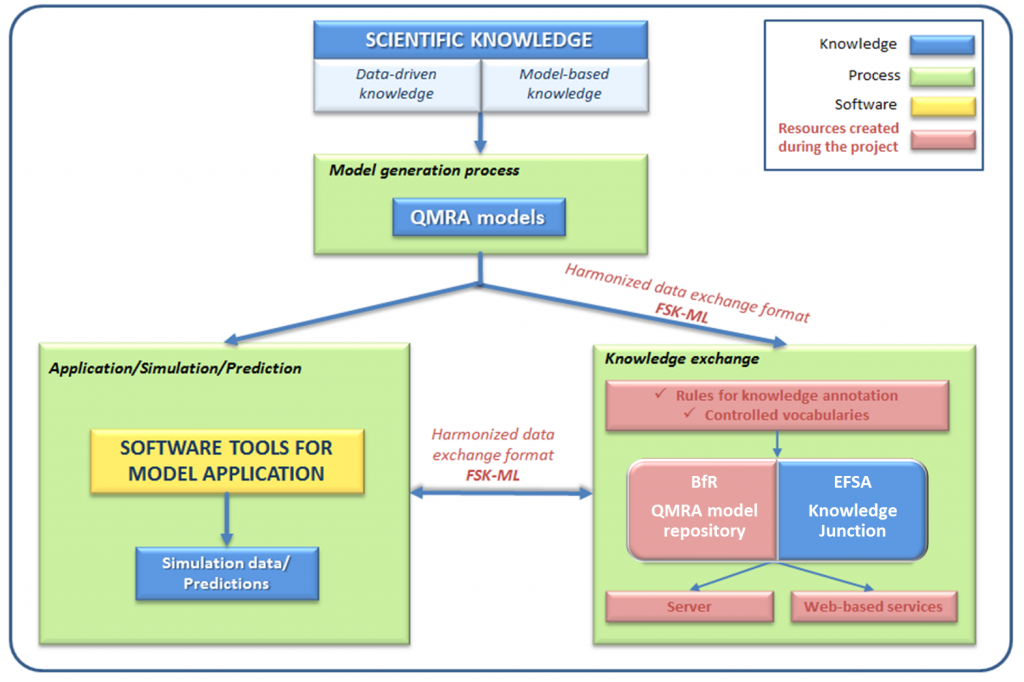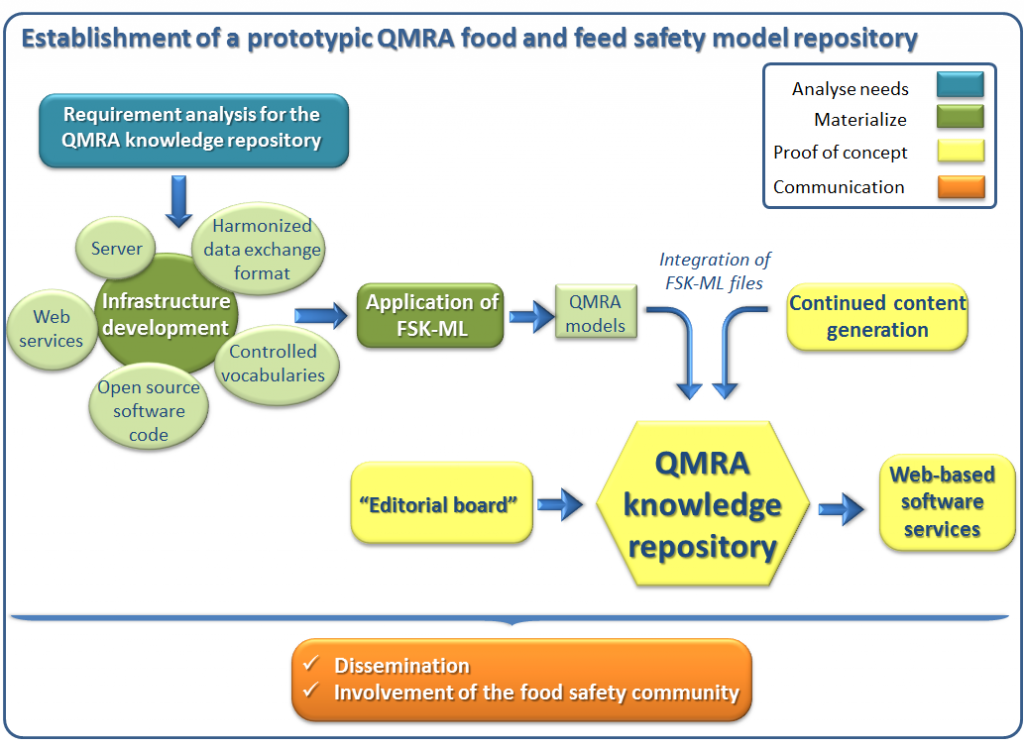1. Abstract
The food safety community is generating a variety of scientific resources and knowledge relevant for quantitative risk assessments like scientific publications, experimental data, databases, mathematical models as well as software tools. However, the access to these resources and the exchange of information between them are usually difficult and time consuming. This project aims at the establishment of an open community infrastructural framework that will facilitate efficient compilation and exchange of mathematical models relevant for quantitative risk assessments. The foundations of this framework are harmonized information exchange formats and consistent rules for knowledge annotation. The project will also establish a prototypic web-based model repository that allows to search, access, download and execute curated risk assessment models described in the proposed information exchange formats. This model repository will interoperate with EFSA’s Knowledge Junction, which will also allow access to the collected resources as well as the provision of digital object identifiers (DOI).
2. Why is our initiative of interest to you?
How many times have you tried to apply mathematical models published in a scientific article?
As you probably have realized, this is frequently a challenging and laborious task, especially when performed for the first time. The development of standards for encoding models and of harmonized rules for model annotation will facilitate greatly the information exchange between academic, private and public sector research and risk assessors.
Why is this initiative different from others?
As illustrated in Figure 1, Quantitative Microbial Risk Assessment (QMRA) models are currently generated by modelling experts using different software tools, some of which are publicly available while others are commercial products. Some initiatives aim at the creation of databases and model repositories that facilitate the exchange of risk assessment models between different users. However, these initiatives lack the underpinning of an open, harmonized information exchange format that can serve as a bridge between different software tools. Further, many existing software projects are not designed as open source projects, rendering collaborative software development very difficult. All these issues will be considered and addressed within this EFSA-BfR collaboration project. The objective of this project is to create open infrastructural resources supporting harmonized model annotation, application and sharing, and subsequently to set up a comprehensive infrastructure, that will provide the foundation for efficient re-use and exchange of models in the food safety domain in the future. For this purpose, the project will generate a prototypic model repository that will allow sharing and curating different types of mathematical models or risk assessments. The establishment of such a curated model repository is also expected to promote the adoption of best-practice recommendations for model annotation by the scientific community.
The necessary annotation guidelines and information exchange standards will be developed and tested within this project. It is hoped that based on these results a growing number of external software tools will implement functionalities to support the developed information exchange standards in the future. This will be supported through provisioning supporting software libraries on the basis of open source licences as well. It is envisioned that the tools developed in this project will enable endusers to efficiently share and use risk assessment data and models from other researchers in a software independent manner.
What can you expect from the project?
Figure 2 shows a general overview of the different tasks that will be carried out during the project. To reach the project goal, new community resources will be generated based on two main concepts: harmonization and standardization.
An open information exchange format called “Food Safety Knowledge Markup Language” (FSK-ML) will be extended and validated. This format can be used to describe models and data from the domain of food safety risk assessment in a transparent and reproducible way. FSK-ML and best-practice annotation guidelines will be designed such that they can serve as a bridge between different software tools, data or model repositories and research groups in the future. The project will also demonstrate that external tools can import and/or export FSK-ML formatted data and models extending their original application areas. This will be facilitated through development of new open source software libraries and converter tools that will be made freely available to the scientific community. All these resources will facilitate stringent quality control, e.g. through enabling the application of models in different, independent software tools.
 Figure 1: Overview on the project’s scope and relevant components
Figure 1: Overview on the project’s scope and relevant components
Once this underlying infrastructure has been developed and validated, this project will create a prototypic model repository for illustration purposes. This model repository prototype will contain an initial collection of already published food safety models, and will be operational at the end of the project. The model repository will provide search and filtering functionalities and allow the execution of model files in the FSK-ML format. As these model files include all information needed to run the models, the users will be able to easily modify, adapt or combine models according to their needs. Interested users will be able to access models through a dedicated web site as well as through EFSA’s Knowledge Junction. Through EFSA’s Knowledge Junction models will also be assigned a DOI, facilitating, thus, further dispersion and reproducibility of the models in a transparent way. During the project a large effort will be invested into populating the model repository with relevant mathematical or risk assessment models. BfR will also support EFSA in their efforts to establish an “editorial board” for the curation of models in a future “productive-mode” model repository.
In addition, dedicated web-based services will be developed within the project so that it will become possible to run a model online and e.g. create simple simulations for user-defined scenario settings. The graphical user interface (GUI) of the web service will allow the end-users to define these scenarios easily. The openFSMR website, already available online (https://sites.google.com/site/openfsmr/), will be used as a basis for the GUI development.
3. Communication of project results and stakeholder integration
Early involvement of the food safety community is important for the shaping and the success of this project. For this purpose, the project plans to establish contacts with experts and intended users within the EU/EEA countries. Regular communication will be achieved through an annual newsletter, but also with ad hoc e-mail communication whenever necessary or when questions from the community arise. The overall project results will be reported in a final report and will be discussed in an international expert workshop, whose results will be published.
 Figure 2: General overview of the work plan
Figure 2: General overview of the work plan
In addition all the documents including new versions of mathematical models, new software and infrastructural resources for harmonized import/export of models as well as the description of the model repository prototype will be made available to EFSA, so that they can be shared within the scientific community.
4. The invitation
You are warmly invited to contact us with all your questions and also to provide us with contact details of interested experts within your organisations, so that we can establish the necessary communication channels. Once the prototypic model repository becomes available we plan to provide these experts with access to it in order to receive suggestions and comments that could be considered for further development in the project. We would also be very happy to consider your models for inclusion in the prototypic model repository, in case you are interested in sharing them.
4. We want you to be involved
We want to know your opinion or questions!
Please don’t hesitate to contact us:
| Matthias Filter German Federal Institute for Risk Assessment (BfR) Unit Food Technologies, Supply Chains and Food Defence Department Biological Safety Matthias.Filter@bfr.bund.de |
Marios Georgiadis European Food Safety Authority (EFSA) Assessment and Methodological Support Unit (AMU)Marios.GEORGIADIS@efsa.europa.eu |